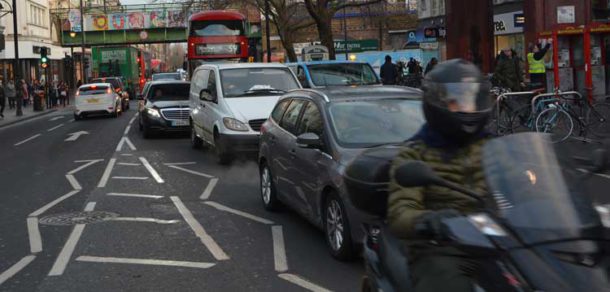
Extra parking charges for drivers of diesel vehicles, closure of the Popes Road toilets and the loss of half term playgroups are among a long list of measures that Lambeth council’s cabinet will discuss tonight (6 February) as it prepares to balance its budget for the next two years.
As well as large and small cuts, the council is looking to raise money. The diesel parking charge, which could raise £150,000 a year, is only one proposal that could affect motorists in Brixton which suffers dangerous levels of vehicle-generated pollution. There are also plans to introduce more controlled parking zones (CPZs) in the borough, raising a planned £1 million that would go towards highways expenditure.
Another £300,000 is expected to come from early implementation of CPZs in Myatt’s Fields and Brixton Hill, “subject to consultation” and “assessment of demand from residents”.
While more parking restrictions and the proposed closure of the Popes Road toilets may grab headlines, the council’s proposed savings in other areas will affect many of the most vulnerable people in the borough as well as its own staff.
In the current financial year, 2016/2017, the council has a budget of £281,901,000. To deal with cuts in central government funding, increased demand for new and existing services and other issues, it plans to reduce this by £46,617,000 by the financial year 2019/2020.
Large parts of the savings are planned to come from the budgets for adults and health (£9,065,000), children (£8,903,000) and a saving of about £11 million on staffing.
Planned increases in council tax are also included.
Most of the staff savings are planned to come from a “councilwide organisational redesign” involving management and “back office” staffing.
Other proposals include a net reduction in spending on public health of nearly £5 million. Nearly £3 million of this reduction will be the result of cuts in central government grants for this area.
Spending on sexual health is planned to be down by more than £2.5 million by 2020. The council plans to achieve this by reducing the cost of contracts and other services it buys in this area. Both the local hospital trusts – Kings and Guy’s & St Thomas’ – are involved in planning for this.
More than £2 million less will be spent on health work with children and £1 million less on substance misuse work by 2020.
The council document setting out the planned cuts says the reduction in substance misuse work could result in the loss of specialist support around welfare rights and “may mean that some of those with more complex needs may not have those needs met as they are unable to navigate mainstream services”.
Treatment services are already at capacity and responding to any increase in need will create “capacity pressure”, the document says.

About £250,000 would be saved by reducing the capacity of the council’s Safer Streets Team which would be responsible only for working with “the most high risk individuals who are currently rough sleeping”. No further case work on anti-social behaviour would be done. The council document says this could have an impact on rough sleeping in the borough.
As well as the very large sums involved in health and running the whole council, dozens of smaller changes are planned, including £10,000 off the mayor’s budget; reduction in funding for Lambeth Youth Council from £81,000 a year at present to £40,000 in 2019/20; and increasing the fee for garden waste collections from £45 a year to £60.
The council’s arts budget will be cut by £50,000 – nearly halving it by 2020. This will be achieved by ending any remaining grant funding for arts organisations. Staff will be retained to focus on securing external funding for arts and culture in the borough and using the community infrastructure levy (a planning charge) or development income for public art and culture.
Nearly £1.5 million will be saved by the end of a three-year programme of grant funding for youth and play sites and bringing forward planned savings from later stages of the programme. The council’s document warns that half term services at Max Roach Park and Dexter Road play project on Railton Road are likely to be lost.
The council plans to be raising income of more than £7 million a year by 2020 – mainly (£5 million) through “investments”. This aspect of the budget will be subject to independent assessment and council members will decide on any investment plan before it goes ahead.
Other income generating measures include sponsorship (£100,000) and selling services of the Grimebusters graffiti cleaning service (£43,000).
Nearly £1 million is expected to be saved from the council’s budget for children’s centres by introducing a “cluster system” reducing duplication or services.
Because the council’s duties in this area are controlled by law, it requires agreement for its plans from current children’s centre providers – mainly schools. If it cannot get this, it says, “There is some risk to the achievement of positive outcomes for children and families”.
The cluster model, the council says, will “be more limited than previously and families will need to travel further to access services”.
Closure of the Popes Road toilet as part of the “Brixton redevelopment programme”, saving £60,000, risks “poor public perception”, the council notes. “If the newly introduced charging regime is successful the redevelopment will build public toilet facilities with charges to make it financially sustainable,” it says.
You can download a spreadsheet setting out the detail of the council’s entire plan.
You can also download the agenda and the dozen documents that the cabinet meeting will consider.






